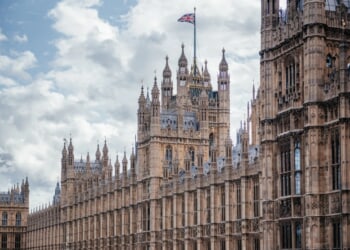Garvan Walshe is a former national and international security policy adviser to the Conservative Party. He runs Article7 – Intelligence for Democrats.
Some twenty years ago a politician in the wilderness went on a book tour, speaking to rooms of 20 people at a time, telling us that we had “a thousand days” to prevent Iran acquiring a nuclear weapon. Seven and half thousand days later, the same man launched his attack for that purpose.
Netanyahu had finally, over the objections of several cycles of IDF leaders, US presidents both Republican and Democrat, and European and Arab states, managed to attack Iran’s nuclear programme.
This was not because the European or Arab leaders, or previous US presidents, had supported the Iranian nuclear programme. Quite the opposite.
But they worried about the risks: would the attack fail in practice, and only encourage Iran to accelerate its bomb-making? What about retaliation by Iranian allies in Hezbollah and Syria? Would covert methods not offer similar reward for less risk? Would this cause the Iranian people, deeply angry with their regime’s repression and economic failureto rally around the flag, as they had done during he Iran-Iraq war, which entrenched a system that might not otherwise have survived?
I have myself on numerous occasions made these same arguments in this column: getting rid of the Iranian nuclear bomb would be a good idea; but since knowledge can’t be eliminated, it is really a matter of judging the progress of what Netanyahu himself called Iran’s two clocks: the nuclear clock, towards a bomb; or the political clock, towards a revolution. Which one would tick first?
I should declare a personal interest here: I was educated at a school established by Iranian exiles from the 1979 revolution, one also attended by numerous Israelis. These countries don’t have to be enemies. The feud is the product of the Iranian regime’s ideology, not a structural factor in either Iranian or Israeli society.
What can we now say of those arguments against the military destruction of Iran’s nuclear programme? As Iran has got closer to a bomb (the IAEA now says it has enough fissile material to make ten weapons), the effects of acceleration are less. A mission might still fail, but could not accelerate Iran’s programme, which is advancing fast anyway, very much.
With Hezbollah defeated, and Bashar al-Assad staying away from windows in Russia, those considerations too can be put aside. Covert operations have of course been continuing; Israel’s version of the Ukrainian “spiderweb” attack with drones was, however, woven into a conventional military assault.
There remains the question of the political clock. Iran’s regime is even more unpopular than it was five years ago, the previous time pressure for a military attack was at its height. The Women, Life, Freedom uprising that followed the police killing of Mahsa Amini was the most serious threat to the regime since the Green Revolution of 2009. It even caused the regime to make concessions on the compulsory hijab.
Conversely, the opportunity for a constitutional transition to a more democratic government has receded.
Iran’s Supreme Leader is appointed by a body of clerics called the Assembly of Experts. the previous Assembly had a relatively liberal majority who had considered replacing the Supreme Leadership with a committee or even, in the style of the religious fundamentalist Dutch Republic when they didn’t want to appoint a Prince of Orange to be Stadtholder, leave the post vacant.
The elections were the current one were rigged to produce a reliable pro-regime majority. There is thus, again, less to be lost by a calibrated Israeli campaign. (More calibration is in order. Israel Katz, Israel’s foreign minister, was forced to “clarify” that his remarks telling Tehranians they should be “terrified” by Israeli operations meant no such thing, and that it was self-evident they should not be harmed.)
The main remaining target, apart from continued suppression of Iranian missile launchers and air defences, is the nuclear complex buried deep underground at Fordow, south of Tehran. There is growing noise suggesting that Netanyahu is trying to get the US to take on its destruction, and to the extent that Trumps’s words match his actions, that the US might add its bunker-buster bombs to the effort.
Yet the site is too deep even for these bombs; it was designed to be protected from them. Since Israel has air superiority over this region of Tehran, it would be prudent to treat this as a distraction, and expect it to focus on a ground operation to destroy the complex.
Netanyahu meanwhile has been calling on Iranians to rise up against their oppressors, even taking to an opposition Iranian TV station, to spread the message. This is not likely to be effective.
More relevant is whether the military pressure simply weakens the regime’s hold on the country, as it is forced to fight on too many fronts, and therefore returns to a system that grants the opposition more involvement. Achieving complete paralysis of its means of oppression, including the large militia known as the Basij, notorious for rushing at demonstrators on motorbikes, is not something easily done from afar.
The skill in defining war aims is to make them achievable. If Fordow can be destroyed, Israel could declare victory and return its aircraft to base.
The collapse of the Iranian regime would be a nice bonus, but that would not be achieved direclty any more than the establishment of the French Third Republic could be done by force of Prussian arms. It had to happen on its own, and only then after the bloodshed of the Commune.


![Former Bravo Star Charged After Violent Assault Using a Rock-Filled Sock in Tennessee Walmart [WATCH]](https://www.right2024.com/wp-content/uploads/2025/07/Former-Bravo-Star-Charged-After-Violent-Assault-Using-a-Rock-Filled-350x250.jpg)



![Karoline Leavitt Levels CNN's Kaitlan Collins and Other Legacy Media Reporters [WATCH]](https://www.right2024.com/wp-content/uploads/2025/07/Karoline-Leavitt-Levels-CNNs-Kaitlan-Collins-and-Other-Legacy-Media-350x250.jpg)
![Man Arrested After Screaming at Senators During Big Beautiful Bill Debate [WATCH]](https://www.right2024.com/wp-content/uploads/2025/06/Man-Arrested-After-Screaming-at-Senators-During-Big-Beautiful-Bill-350x250.jpg)



![Illegal Alien Walked Free After Decapitating Woman, Abusing Corpse for Weeks [WATCH]](https://www.right2024.com/wp-content/uploads/2025/07/1753013138_Illegal-Alien-Walked-Free-After-Decapitating-Woman-Abusing-Corpse-for-350x250.jpg)





